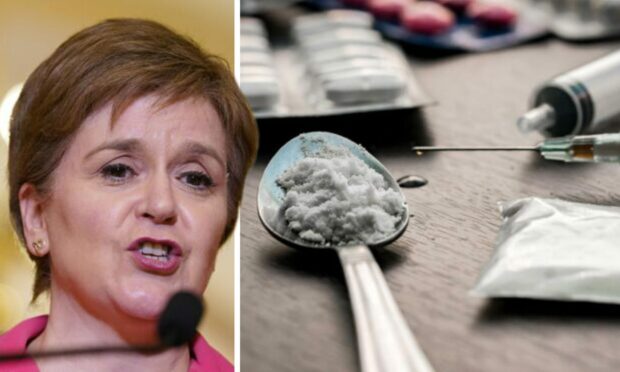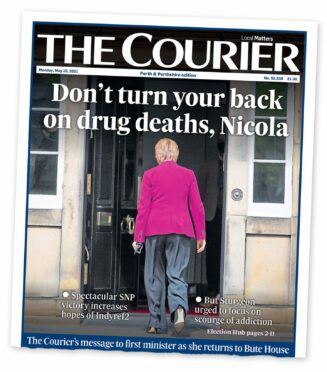Scotland’s politicians have “forgotten” about the drug deaths crisis devastating communities, claim campaigners in a new report calling for changes to treatment.
The Faces and Voices of Recovery (FAVOR) one-year report says politicians remain “out-of-touch” with the real situation on the streets of Scottish towns and cities.
Figures released in summer show there were 62 drug deaths in Aberdeen last year – a rise of 10% – and a new record for the city.
Moray had the highest death rate rise in 2021 at 70%, with 17 people dying of drug-related causes, up from 10 in 2020.
The report, which makes six key recommendations to improve the current treatment system, will be launched at Bluevale Community Centre in Glasgow today.
It finds people are often left waiting years for appointments with recovery services and details how some seeking treatment are often given no say in their options.
The analysis states there is a “postcode lottery of treatment” with residential rehabilitation referral processes “still inconsistent across the country”.
The report comes one year after SNP leader Nicola Sturgeon and Scottish Conservative leader Douglas Ross held a one-off meeting at the same location to discuss the crisis.
Earlier this year, Nicola Sturgeon was told to “step up to the plate” and deliver the cultural change needed to tackle Scotland’s drug deaths emergency.
Scottish Conservative leader Douglas Ross said the “damning report shows that drug deaths remain Scotland’s national shame on Nicola Sturgeon’s watch”.
What are the local figures?
A total of 1,330 people died from drug use across Scotland last year – down from 1,339 in 2020.
- Aberdeen: 56 in 2020, rising to 62 in 2021. This is an increase of 10%, one of the highest in Scotland.
- Aberdeenshire: 33 in 2020, has fallen to 31 in 2021.
- Highland: 33 in 2020, has risen to 35 in 2021. This is one short of the local record of 36 from 2018.
- Moray: 17 in 2021, up from 10 in 2020. A joint record with 2018.
- Orkney: Three in 2020, has fallen to one in 2021.
- Shetland: Remains the same on four.
- Western Isles: Remains the same on four.
The report states: “The political elite’s lack of interest is the reason why we’re in this awful mess, where we have the worst drug death rate than anywhere in the United Kingdom or any other country in Europe.
“The drug death crisis gets shunted to the back of the queue when something comes along that is deemed to be more important.”
The first minister pledged to take an active role in tackling the drug deaths crisis after admitting government had taken its eye “off the ball”.
What are the key recommendations?
- Introduce a clear definition of residential rehabilitation place, so that nobody is sent to pretend rehab facilities that are really stabilisation or detox services.
- Introduce a centralised referral and funding system to end the postcode lottery to residential rehab, provide a more consistent approach across the country.
- Introduce guidelines to ensure that psycho-social and mental health support is provided alongside substance management and pharmaceutical treatment.
- Introduce statistics to measure the number of people waiting more than six months, 12 months and 24 months for residential rehabilitation places and other forms of treatment too.
- Introduce a Right to Recovery Bill to ensure that the Scottish Government MAT Standards are actually implemented and people seeking treatment can actually get it.
- Return to community not centralised services. All of the evidence confirms that the centralisation of services has not worked and a return to community-based rehabilitation and recovery services would be beneficial.
FAVOR Scotland CEO, Annemarie Ward, said: “We hoped government investment and the introduction of new guidelines would improve things but unfortunately, the system remains as broken today as it was a year ago.
“Our report identifies the deep-rooted problems and outlines a series of recommendations to improve how we treat people.
“It looks like the politicians have forgotten about Scotland’s drug death crisis, so we hope our Blueprint to Save Lives will remind them that our communities are still suffering and they still need to act.”
Investment in rehabilitation
Drugs Policy Minister Angela Constance said: “As we do all we can to help families cope with the cost of living crisis, we’re even more focused on supporting those affected by problem substance use, delivering real change on the ground and implementing approaches we know can help save lives.
“Anyone who needs support should have access to whatever type of treatment or recovery works best for them.
“For some that will be Medication-Assisted Treatment (MAT), but it could be rehabilitation in the community or residential placements.
“That’s why we are investing £100 million in residential rehabilitation over the course of this Parliament.
“I’ll continue to use all the powers at my disposal, including holding local leaders to account in implementing the MAT standards, to drive improvements across Scotland.”

